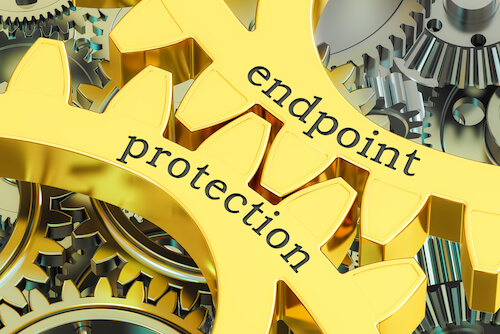Today’s cybersecurity threats are more sophisticated than ever before. They are constantly evolving. As a result, many companies worry that they can’t properly defend themselves against an attack.
Here are just a few of the challenges:
- Viruses, spyware, and other forms of malware
- Data transfer, data loss, and data theft
- Downtime, loss in sales, and potential lawsuits
This list is exactly why endpoint protection is so important. It acts as a security layer over an entire network. It allows system administrators to control access, monitor potential threats, and much more.
Before we get into the details of endpoint security, let’s start with this question:
What Are Endpoints?
Endpoint protection sounds a little abstract if you don’t know what endpoints are. But once endpoints are defined, it becomes easier to see why they pose such a security risk.
On a network, an endpoint is any device that can connect to that network. This includes laptops, tablets, smartphones, workstations, and servers.
Just think of how many endpoints there are at an average organization. People are constantly checking company email on their phones, downloading files from a network drive onto their laptop, and similar activities that involve endpoints accessing the network.

That’s why endpoint security is so important in today’s business environment—employees use a wide range of devices to access the network. In general, this is great because it’s what allows the modern world to be so connected. It also makes workers and firms more productive.
However, it has a downside because each endpoint is a potential gateway to harm the network. If someone downloads a corrupt email attachment or clicks the wrong link, it can threaten the entire system.
Now that we know what endpoints are, let’s move on to what you need to know about endpoint protection:
Endpoint Security Software is Not the Same as Antivirus Software
Protecting against malware (viruses, ransomware, etc.) is an important component of endpoint security — but endpoint protection typically offers a lot more, such as firewall services and email filtering, to name just a few.
And while simple antivirus solutions can be great for personal devices, they aren’t nearly enough to protect enterprise networks from the threats they face.
For example, most simple antivirus programs don’t offer advanced data protection. The right tools allow an organization to prevent data loss on endpoints, protect confidential data across endpoints, block suspicious activity, and much more.
Endpoint Protection Isn’t Just for Big Businesses
Some small businesses think they’re safe because they assume hackers are focused on big companies. But that’s simply not true.
Even most small companies have large amounts of data that cybercriminals would be happy to steal and exploit. Hackers also know that some small firms think they’re immune, which ends up making them a target. So it’s not surprising that 58% of the victims are small businesses.
Endpoint Security Cannot Fully Protect Your Business
Even if you have the best endpoint security on the market and the smartest IT team around, your business is still vulnerable. That’s because cybercriminals try to dupe employees into giving away data, downloading dangerous files, and any other trick that might work.
The bottom line: Endpoint protection is crucial—but employee awareness and training are also important because it’s too easy for someone to accidentally expose the entire network. And hackers are constantly finding new ways to attack, so ideally the training should be repeated every year.


